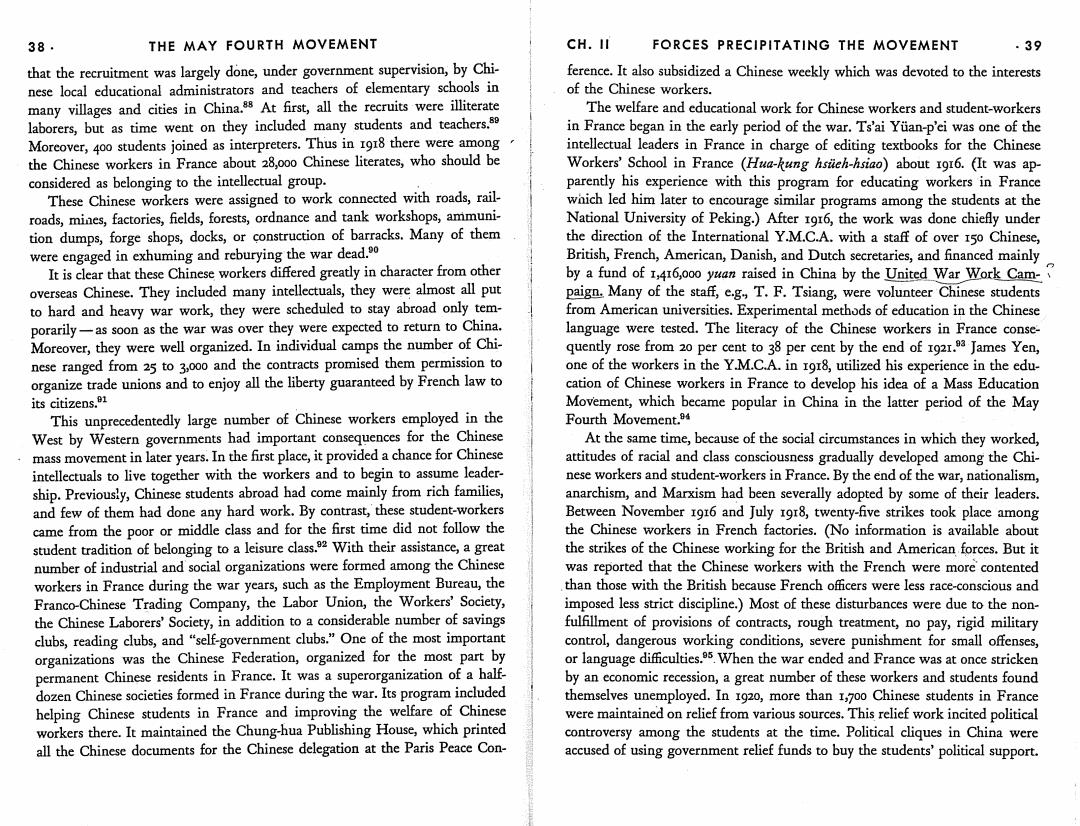
38: THE MAY FOURTH MOVEMENT CH.II FORCES PRECIPITATING THE MOVEMENT ·39 that the recruitment was largely done,under government supervision,by Chi- ference.It also subsidized a Chinese weekly which was devoted to the interests nese local educational administrators and teachers of elementary schools in of the Chinese workers. many villages and cities in China.8 At first,all the recruits were illiterate The welfare and educational work for Chinese workers and student-workers laborers,but as time went on they included many students and teachers.s9 in France began in the early period of the war.Ts'ai Yuian-p'ei was one of the Moreover,400 students joined as interpreters.Thus in 1918 there were among intellectual leaders in France in charge of editing textbooks for the Chinese the Chinese workers in France about 28,o00 Chinese literates,who should be Workers'School in France (Hua-kung hstich-hsiao)about 1916.(It was ap- considered as belonging to the intellectual group. parently his experience with this program for educating workers in France These Chinese workers were assigned to work connected with roads,rail- waich led him later to encourage similar programs among the students at the roads,mines,factories,fields,forests,ordnance and tank workshops,ammuni- National University of Peking.)After 1gr6,the work was done chiefly under tion dumps,forge shops,docks,or construction of barracks.Many of them the direction of the International Y.M.C.A.with a staff of over I5o Chinese, were engaged in exhuming and reburying the war dead.0 British,French,American,Danish,and Dutch secretaries,and financed mainly It is clear that these Chinese workers differed greatly in character from other by a fund of 1,416,000 yuan raised in China by the United War Work Cam- overseas Chinese.They included many intellectuals,they were almost all put paign.Many of the staff,e.g.T.F.Tsiang,were volunteer Chinese students to hard and heavy war work,they were scheduled to stay abroad only tem- from American universities.Experimental methods of education in the Chinese porarily-as soon as the war was over they were expected to return to China. language were tested.The literacy of the Chinese workers in France conse- Moreover,they were well organized.In individual camps the number of Chi- quently rose from 20 per cent to 38 per cent by the end of 2.James Yen, nese ranged from 25 to 3,000 and the contracts promised them permission to one of the workers in the Y.M.C.A.in I9r8,utilized his experience in the edu- organize trade unions and to enjoy all the liberty guaranteed by French law to cation of Chinese workers in France to develop his idea of a Mass Education its citizens. Movement,which became popular in China in the latter period of the May This unprecedentedly large number of Chinese workers employed in the Fourth Movement.4 West by Western governments had important consequences for the Chinese At the same time,because of the social circumstances in which they worked, mass movement in later years.In the first place,it provided a chance for Chinese attitudes of racial and class consciousness gradually developed among the Chi- intellectuals to live together with the workers and to begin to assume leader- nese workers and student-workers in France.By the end of the war,nationalism, ship.Previously,Chinese students abroad had come mainly from rich families, anarchism,and Marxism had been severally adopted by some of their leaders. and few of them had done any hard work.By contrast,these student-workers Between November 1916 and July Igr8,twenty-five strikes took place among came from the poor or middle class and for the first time did not follow the the Chinese workers in French factories.(No information is available about student tradition of belonging to a leisure class.2 With their assistance,a great the strikes of the Chinese working for the British and American forces.But it number of industrial and social organizations were formed among the Chinese was reported that the Chinese workers with the French were more contented workers in France during the war years,such as the Employment Bureau,the than those with the British because French officers were less race-conscious and Franco-Chinese Trading Company,the Labor Union,the Workers'Society, imposed less strict discipline.)Most of these disturbances were due to the non- the Chinese Laborers'Society,in addition to a considerable number of savings fulfillment of provisions of contracts,rough treatment,no pay,rigid military clubs,reading clubs,and "self-government clubs."One of the most important control,dangerous working conditions,severe punishment for small offenses, organizations was the Chinese Federation,organized for the most part by or language difficulties.5.When the war ended and France was at once stricken permanent Chinese residents in France.It was a superorganization of a half- by an economic recession,a great number of these workers and students found dozen Chinese societies formed in France during the war.Its program included themselves unemployed.In Ig20,more than I,700 Chinese students in France helping Chinese students in France and improving the welfare of Chinese were maintained on relief from various sources.This relief work incited political workers there.It maintained the Chung-hua Publishing House,which printed controversy among the students at the time.Political cliques in China were all the Chinese documents for the Chinese delegation at the Paris Peace Con- accused of using government relief funds to buy the students'political support
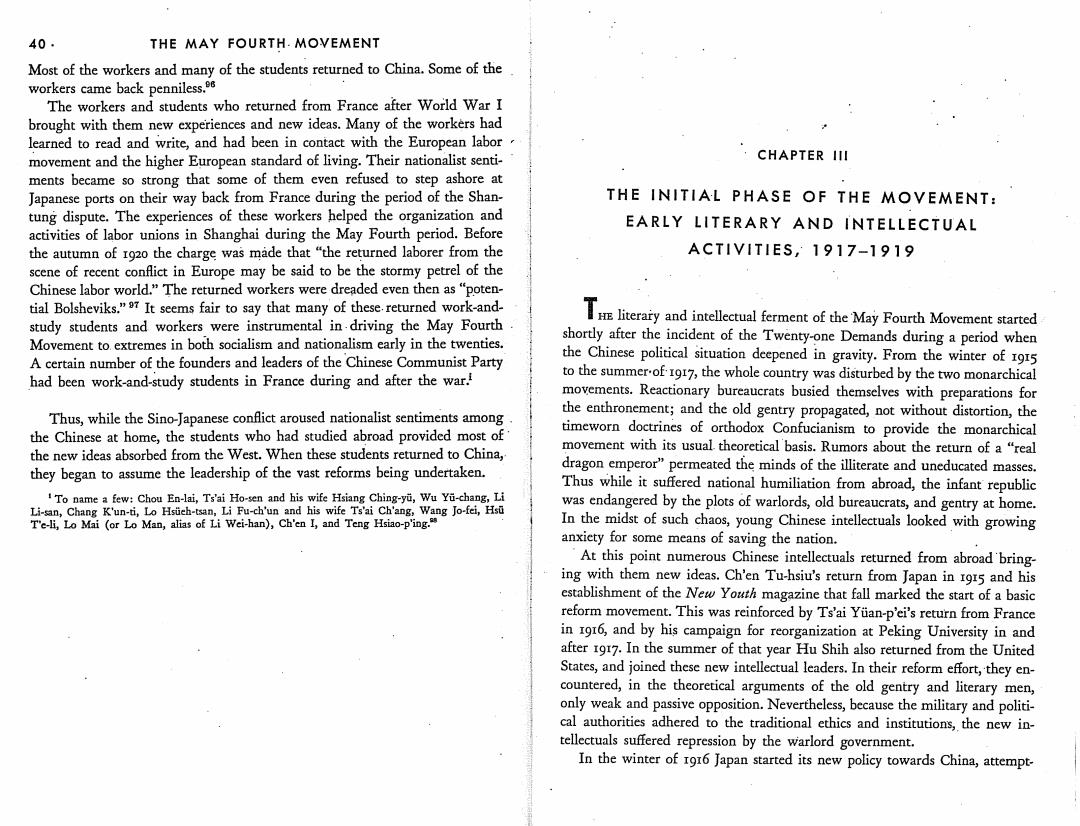
40. THE MAY FOURTH.MOVEMENT Most of the workers and many of the students returned to China.Some of the workers came back penniless.6 The workers and students who returned from France after World War I brought with them new experiences and new ideas.Many of the workers had learned to read and write,and had been in contact with the European labor movement and the higher European standard of living.Their nationalist senti- CHAPTER III ments became so strong that some of them even refused to step ashore at Japanese ports on their way back from France during the period of the Shan- THE INITIAL PHASE OF THE MOVEMENT: tung dispute.The experiences of these workers helped the organization and EARLY LITERARY AND INTELLECTUAL activities of labor unions in Shanghai during the May Fourth period.Before the autumn of 1gzo the charge was made that "the returned laborer from the ACTIVITIES,1917-1919 scene of recent conflict in Europe may be said to be the stormy petrel of the Chinese labor world."The returned workers were dreaded even then as "poten- tial Bolsheviks."It seems fair to say that many of these.returned work-and- study students and workers were instrumental in driving the May Fourth eayd elcuferm f theM out Movme Movement to.extremes in both socialism and nationalism early in the twenties. shortly after the incident of the Twenty-one Demands during a period when A certain number of the founders and leaders of the Chinese Communist Party the Chinese political situation deepened in gravity.From the winter of I9I5 had been work-and-study students in France during and after the war. to the summer of 1917,the whole country was disturbed by the two monarchical movements.Reactionary bureaucrats busied themselves with preparations for Thus,while the Sino-Japanese conflict aroused nationalist sentiments among. the enthronement;and the old gentry propagated,not without distortion,the the Chinese at home,the students who had studied abroad provided most of timeworn doctrines of orthodox Confucianism to provide the monarchical the new ideas absorbed from the West.When these students returned to China, movement with its usual theoretical basis.Rumors about the return of a"real they began to assume the leadership of the vast reforms being undertaken. dragon emperor"permeated the minds of the illiterate and uneducated masses. Thus while it suffered national humiliation from abroad,the infant republic To name a few:Chou En-lai,Ts'ai Ho-sen and his wife Hsiang Ching-yu,Wu Yu-chang,Li Li-san,Chang K'un-ti,Lo Hsuich-tsan,Li Fu-ch'un and his wife Ts'ai Ch'ang,Wang Jo-fei,Hsu was endangered by the plots of warlords,old bureaucrats,and gentry at home. Te-li,Lo Mai (or Lo Man,alias of Li Wei-han),Ch'en I,and Teng Hsiao-p'ing." In the midst of such chaos,young Chinese intellectuals looked with growing anxiety for some means of saving the nation. At this point numerous Chinese intellectuals returned from abroad bring- ing with them new ideas.Ch'en Tu-hsiu's return from Japan in Ior5 and his establishment of the New Youth magazine that fall marked the start of a basic reform movement.This was reinforced by Ts'ai Yuan-p'ei's return from France in 1916,and by his campaign for reorganization at Peking University in and after 1917.In the summer of that year Hu Shih also returned from the United States,and joined these new intellectual leaders.In their reform effort,they en- countered,in the theoretical arguments of the old gentry and literary men, only weak and passive opposition.Nevertheless,because the military and politi- cal authorities adhered to the traditional ethics and institutions,the new in- tellectuals suffered repression by the warlord government. In the winter of 196 Japan started its new policy towards China,attempt-
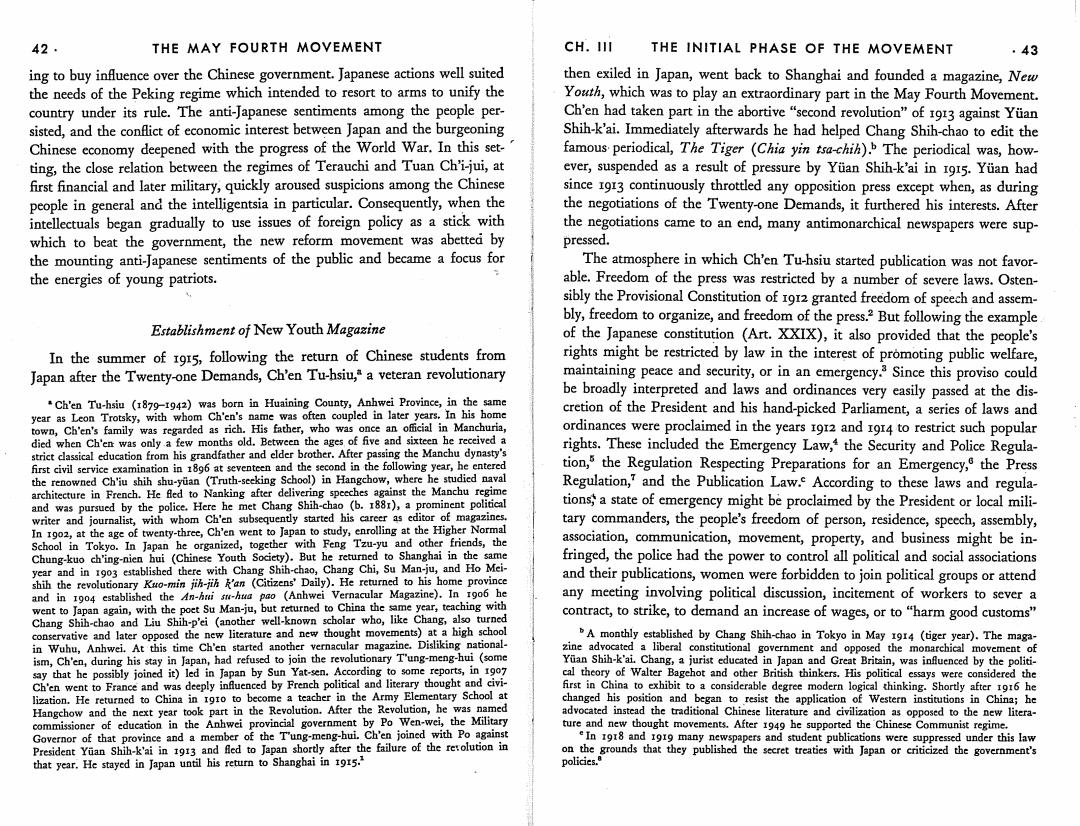
42· THE MAY FOURTH MOVEMENT CH.III THE INITIAL PHASE OF THE MOVEMENT ,43 ing to buy influence over the Chinese government.Japanese actions well suited then exiled in Japan,went back to Shanghai and founded a magazine,Neto the needs of the Peking regime which intended to resort to arms to unify the Youth,which was to play an extraordinary part in the May Fourth Movement. country under its rule.The anti-Japanese sentiments among the people per- Ch'en had taken part in the abortive "second revolution"of 1913 against Yuan sisted,and the conflict of economic interest between Japan and the burgeoning Shih-k'ai.Immediately afterwards he had helped Chang Shih-chao to edit the Chinese economy deepened with the progress of the World War.In this set- famous periodical,The Tiger (Chia yin tsa-chih).b The periodical was,how- ting,the close relation between the regimes of Terauchi and Tuan Ch'i-jui,at ever,suspended as a result of pressure by Yuan Shih-k'ai in 1915.Yuan had first financial and later military,quickly aroused suspicions among the Chinese since 1oI3 continuously throttled any opposition press except when,as during people in general and the intelligentsia in particular.Consequently,when the the negotiations of the Twenty-one Demands,it furthered his interests.After intellectuals began gradually to use issues of foreign policy as a stick with the negotiations came to an end,many antimonarchical newspapers were sup- which to beat the government,the new reform movement was abetted by pressed. the mounting anti-Japanese sentiments of the public and became a focus for The atmosphere in which Ch'en Tu-hsiu started publication was not favor- the energies of young patriots. able.Freedom of the press was restricted by a number of severe laws.Osten- sibly the Provisional Constitution of Ior2 granted freedom of speech and assem- bly,freedom to organize,and freedom of the press.?But following the example Establishment of New Youth Magazine of the Japanese constitution (Art.XXIX),it also provided that the people's In the summer of I9r5,following the return of Chinese students from rights might be restricted by law in the interest of promoting public welfare, Japan after the Twenty-one Demands,Ch'en Tu-hsiu,"a veteran revolutionary maintaining peace and security,or in an emergency.3 Since this proviso could be broadly interpreted and laws and ordinances very easily passed at the dis- *Ch'en Tu-hsiu (1879-1942)was born in Huaining County,Anhwei Province,in the same year as Leon Trotsky,with whom Ch'en's name was often coupled in later years.In his home cretion of the President and his hand-picked Parliament,a series of laws and town,Ch'en's family was regarded as rich.His father,who was once an official in Manchuria, ordinances were proclaimed in the years I9r2 and Ior4 to restrict such popular died when Ch'en was only a few months old.Between the ages of five and sixteen he received a strict classical education from his grandfather and elder brother.After passing the Manchu dynasty's rights.These included the Emergency Law,4 the Security and Police Regula- first civil service examination in 1896 at seventeen and the second in the following year,he entered tion,s the Regulation Respecting Preparations for an Emergency,s the Press the renowned Ch'iu shih shu-yuan (Truth-sccking School)in Hangchow,where he studied naval architecture in French.He fed to Nanking after delivering speeches against the Manchu regime Regulation,and the Publication Law.According to these laws and regula- and was pursued by the police.Here he met Chang Shih-chao (b.1881),a prominent political tions,a state of emergency might be proclaimed by the President or local mili- writer and journalist,with whom Ch'en subsequently started his career as editor of magazines. tary commanders,the people's freedom of person,residence,speech,assembly, In 1902,at the age of twenty-three,Ch'en went to Japan to study,enrolling at the Higher Normal School in Tokyo.In Japan he organized,together with Feng Tzu-yu and other friends,the association,communication,movement,property,and business might be in- Chung-kuo ch'ing-nien hui (Chinese Youth Society).But he returned to Shanghai in the same fringed,the police had the power to control all political and social associations year and in 1903 established there with Chang Shih-chao,Chang Chi,Su Man-ju,and Ho Mei- shih the revolutionary Kuo-min jih-jih 'an (Citizens'Daily).He returned to his home province and their publications,women were forbidden to join political groups or attend and in 1904 established the An-hni su-hua pao (Anhwei Vernacular Magazine).In 1906 he any meeting involving political discussion,incitement of workers to sever a went to Japan again,with the poet Su Man-ju,but returned to China the same year,teaching with Chang Shih-chao and Liu Shih-p'ei (another well-known scholar who,like Chang,also turned contract,to strike,to demand an increase of wages,or to"harm good customs" conservative and later opposed the new literature and new thought movements)at a high school in Wuhu,Anhwei.At this time Ch'en started another vernacular magazine.Disliking national. A monthly established by Chang Shih-chao in Tokyo in May 1914 (tiger year).The maga- zine advocated a liberal constitutional government and opposed the monarchical movement of ism,Ch'en,during his stay in Japan,had refused to join the revolutionary T'ung-meng-hui (some Yuan Shih-k'ai.Chang,a jurist educated in Japan and Great Britain,was influenced by the politi- say that he possibly joined it)led in Japan by Sun Yat-sen.According to some reports,in 19o7 cal theory of Walter Bagehot and other British thinkers.His political essays were considered the Ch'en went to France and was deeply influenced by French political and literary thought and civi- first in China to exhibit to a considerable degree modern logical thinking.Shortly after 1916 he lization.He returned to China in rgro to become a teacher in the Army Elementary School at changed his position and began to resist the application of Western institutions in China;he Hangchow and the next year took part in the Revolution.After the Revolution,he was named advocated instead the traditional Chinese literature and civilization as opposed to the new litera- commissioner of education in the Anhwei provincial government by Po Wen-wei,the Military ture and new thought movements.After 1949 he supported the Chinese Communist regime. Governor of that province and a member of the T'ung-meng-hui.Ch'en joined with Po against In 1918 and 191 many newspapers and student publications were suppressed under this law President Yuan Shih-k'ai in 1913 and fed to Japan shortly after the failure of the retolution in on the grounds that they published the secret treaties with Japan or criticized the government's that year.He stayed in Japan until his return to Shanghai in 1915. policies
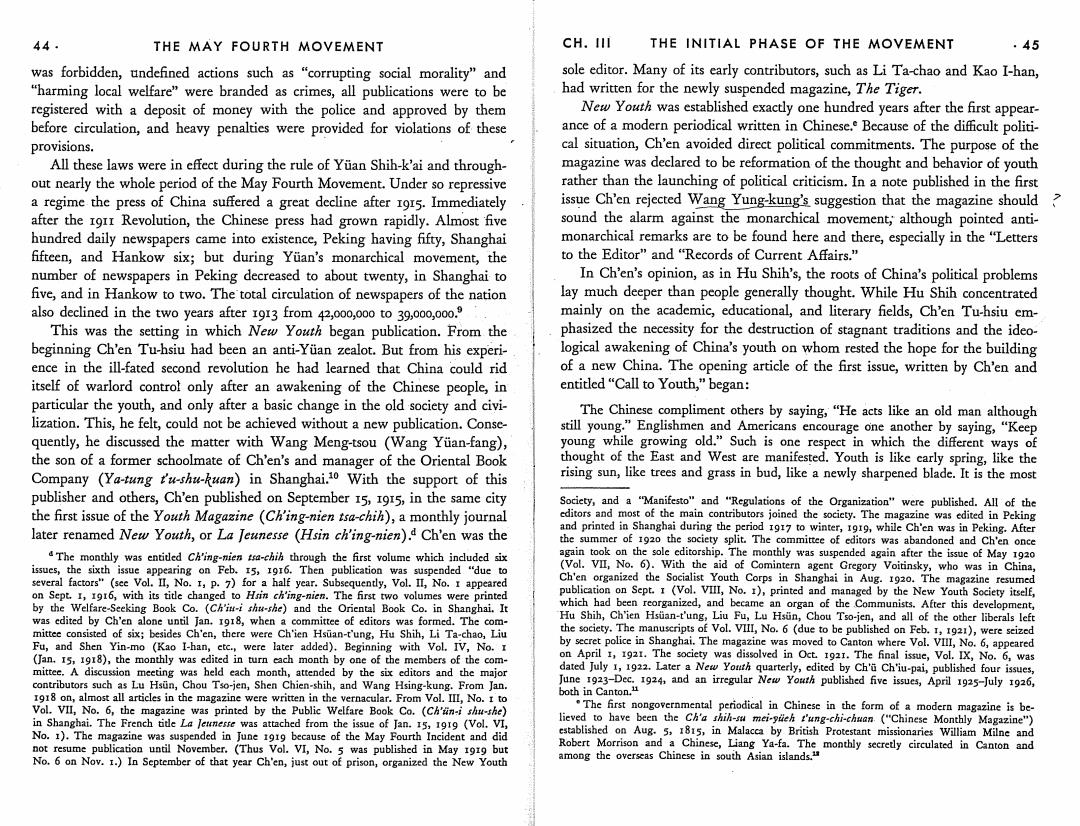
44… THE MAY FOURTH MOVEMENT CH.IlI THE INITIAL PHASE OF THE MOVEMENT ·45 was forbidden,undefined actions such as "corrupting social morality"and sole editor.Many of its early contributors,such as Li Ta-chao and Kao I-han, "harming local welfare"were branded as crimes,all publications were to be had written for the newly suspended magazine,The Tiger. registered with a deposit of money with the police and approved by them New Youth was established exactly one hundred years after the first appear- before circulation,and heavy penalties were provided for violations of these ance of a modern periodical written in Chinese.Because of the difficult politi- provisions. cal situation,Ch'en avoided direct political commitments.The purpose of the All these laws were in effect during the rule of Yuan Shih-k'ai and through- magazine was declared to be reformation of the thought and behavior of youth out nearly the whole period of the May Fourth Movement.Under so repressive rather than the launching of political criticism.In a note published in the first a regime the press of China suffered a great decline after I9I5.Immediately issue Ch'en rejected Wang Yung-kung's suggestion that the magazine should after the ioIr Revolution,the Chinese press had grown rapidly.Almost five sound the alarm against the monarchical movement,although pointed anti- hundred daily newspapers came into existence,Peking having fifty,Shanghai monarchical remarks are to be found here and there,especially in the "Letters fifteen,and Hankow six;but during Yuan's monarchical movement,the to the Editor'”and“Records of Current Affairs.” number of newspapers in Peking decreased to about twenty,in Shanghai to In Ch'en's opinion,as in Hu Shih's,the roots of China's political problems five,and in Hankow to two.The total circulation of newspapers of the nation lay much deeper than people generally thought.While Hu Shih concentrated also declined in the two years after IgI3 from 42,000,o00 to 39,000,000. mainly on the academic,educational,and literary fields,Ch'en Tu-hsiu em- This was the setting in which New Youth began publication.From the phasized the necessity for the destruction of stagnant traditions and the ideo- beginning Ch'en Tu-hsiu had been an anti-Yuan zcalot.But from his experi- logical awakening of China's youth on whom rested the hope for the building ence in the ill-fated second revolution he had learned that China could rid of a new China.The opening article of the first issue,written by Ch'en and itself of warlord control only after an awakening of the Chinese people,in entitled"Call to Youth,"began: particular the youth,and only after a basic change in the old socicty and civi- The Chinese compliment others by saying,"He acts like an old man although lization.This,he felt,could not be achieved without a new publication.Conse- still young."Englishmen and Americans encourage one another by saying,"Keep quently,he discussed the matter with Wang Meng-tsou (Wang Yuan-fang), young while growing old."Such is one respect in which the different ways of the son of a former schoolmate of Ch'en's and manager of the Oriental Book thought of the East and West are manifested.Youth is like early spring,like the Company (Ya-tung tu-shu-kuan)in Shanghai.With the support of this rising sun,like trees and grass in bud,like a newly sharpened blade.It is the most publisher and others,Ch'en published on September 15,19r5,in the same city Socicty,and a "Manifesto"and "Regulations of the Organization"were published.All of the the first issue of the Youth Magazine (Ch'ing-nien tsa-chih),a monthly journal editors and most of the main contributors joined the society.The magazine was edited in Peking later renamed New Youth,or La Jeunesse (Hsin ch'ing-nien)d Ch'en was the and printed in Shanghai during the period 1917 to winter,1919,while Ch'en was in Peking.After the summer of 192o the society split.The committee of editors was abandoned and Ch'en once 4 The monthly was entitled Ch'ing-nien ta-chih through the first volume which included six again took on the sole editorship.The monthly was suspended again after the issue of May 1920 issues,the sixth issue appearing on Feb.I5,19r6.Then publication was suspended "due to (Vol.VII,No.6).With the aid of Comintern agent Gregory Voitinsky,who was in China, several factors"(see Vol.I,No.1,p.7)for a half year.Subsequently,Vol.II,No.I appeared Ch'en organized the Socialist Youth Corps in Shanghai in Aug.1920.The magazine resumed on Sept.1,1916,with its title changed to Hsin ch'ing-nien.The first two volumes were printed publication on Sept.I (Vol.VIII,No.1),printed and managed by the New Youth Society itself, by the Welfare-Seeking Book Co.(Ch'iu-i shu-she)and the Oriental Book Co.in Shanghai.It which had been reorganized,and became an organ of the Communists.After this development, was edited by Ch'en alone until Jan.1918,when a committee of editors was formed.The com- Hu Shih,Ch'ien Hstan-t'ung,Liu Fu,Lu Hsun,Chou Tso-jen,and all of the other liberals left mittee consisted of six;besides Ch'en,there were Ch'ien Hsuan-t'ung,Hu Shih,Li Ta-chao,Liu the society.The manuscripts of Vol.VIII,No.6(due to be published on Feb.I,1921),were scized Fu,and Shen Yin-mo (Kao I-han,ctc.,were later added).Beginning with Vol.IV,No.I by secret police in Shanghai.The magazine was moved to Canton where Vol.VII,No.6,appeared (Jan.I5,198),the monthly was edited in turn each month by one of the members of the com- on April I,1921.The society was dissolved in Oct.1921.The final issuc,Vol.IX,No.6,was mittee.A discussion meeting was held each month,attended by the six editors and the major dated July I,1922.Later a New Youth quarterly,edited by Ch'u Ch'iu-pai,published four issues, contributors such as Lu Hstn,Chou Tso-jen,Shen Chien-shih,and Wang Hsing-kung.From Jan. June 1923-Dec.1924,and an irregular New Youth published five issues,April 1925-July 1926, 1918 on,almost all articles in the magazine were written in the vernacular.From Vol.III,No.I to both in Canton, Vol.VII,No.6,the magazine was printed by the Public Welfare Book Co.(Ch'tin-i shu-the) .The first nongovernmental periodical in Chinese in the form of a modern magazine is be- in Shanghai.The French tidle La lemnesre was attached from the issue of Jan.15,1919 (Vol.VI, lieved to have been the Ch'a shih-su mei-ytieh t'ung-chi-chuan.("Chinese Monthly Magazine") No.I).The magazine was suspended in June 1919 because of the May Fourth Incident and did established on Aug.5,1815,in Malacca by British Protestant missionaries William Milne and not resume publication until November.(Thus Vol.VI,No.5 was published in May 1919 but Robert Morrison and a Chinese,Liang Ya-fa.The monthly secretly circulated in Canton and No.6 on Nov.1.)In September of that year Ch'en,just out of prison,organized the New Youth among the overseas Chinese in south Asian islands
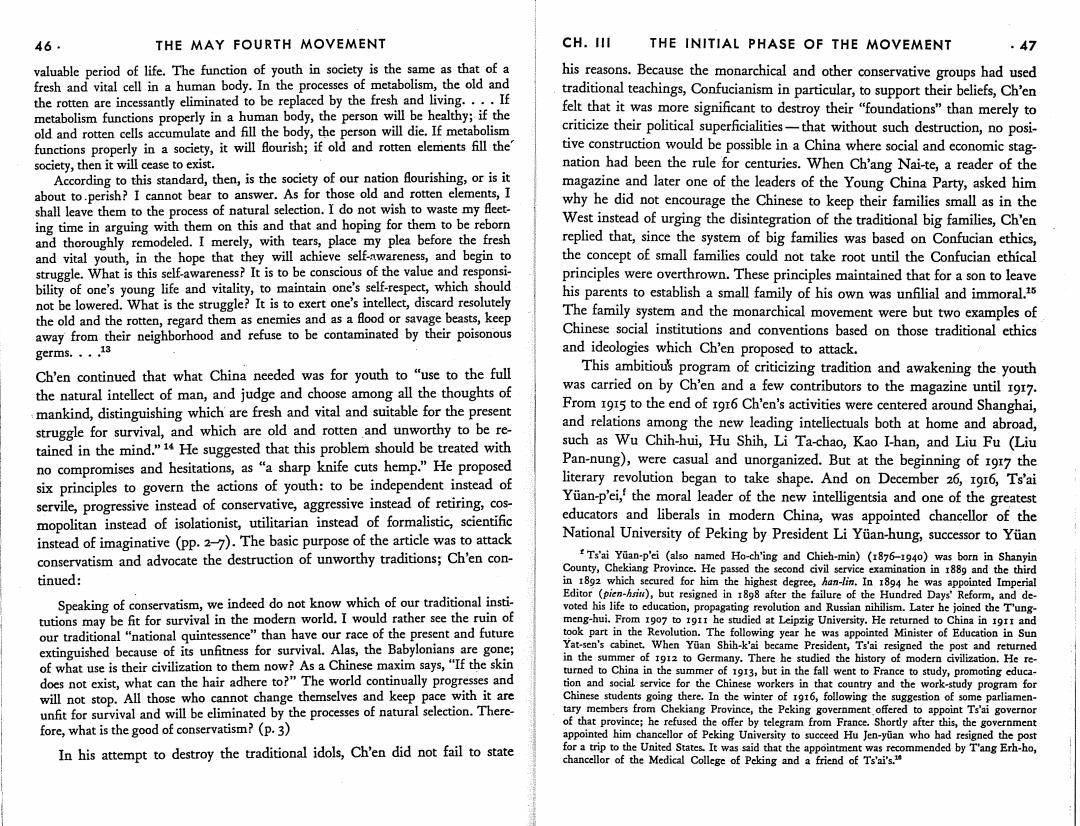
46. THE MAY FOURTH MOVEMENT CH.III THE INITIAL PHASE OF THE MOVEMENT .47 valuable period of life.The function of youth in society is the same as that of a his reasons.Because the monarchical and other conservative groups had used fresh and vital cell in a human body.In the processes of metabolism,the old and the rotten are incessantly eliminated to be replaced by the fresh and living....If traditional teachings,Confucianism in particular,to support their beliefs,Ch'en metabolism functions properly in a human body,the person will be healthy;if the felt that it was more significant to destroy their"foundations"than merely to old and rotten cells accumulate and fill the body,the person will die.If metabolism criticize their political superficialities-that without such destruction,no posi- functions properly in a society,it will flourish;if old and rotten elements fill the tive construction would be possible in a China where social and economic stag- society,then it will cease to exist. nation had been the rule for centuries.When Ch'ang Nai-te,a reader of the According to this standard,then,is the society of our nation flourishing,or is it magazine and later one of the leaders of the Young China Party,asked him about to.perish?I cannot bear to answer.As for those old and rotten elements,I shall leave them to the process of natural selection.I do not wish to waste my fleet- why he did not encourage the Chinese to keep their families small as in the ing time in arguing with them on this and that and hoping for them to be reborn West instead of urging the disintegration of the traditional big families,Ch'en and thoroughly remodeled.I merely,with tears,place my plea before the fresh replied that,since the system of big families was based on Confucian ethics, and vital youth,in the hope that they will achieve self-awareness,and begin to the concept of small families could not take root until the Confucian ethical struggle.What is this self-awareness?It is to be conscious of the value and responsi- principles were overthrown.These principles maintained that for a son to leave bility of one's young life and vitality,to maintain one's self-respect,which should not be lowered.What is the struggle?It is to exert one's intellect,discard resolutely his parents to establish a small family of his own was unfilial and immoral.5 the old and the rotten,regard them as enemies and as a food or savage beasts,keep The family system and the monarchical movement were but two examples of away from their neighborhood and refuse to be contaminated by their poisonous Chinese social institutions and conventions based on those traditional ethics gcrm5..,,13 and ideologies which Ch'en proposed to attack. Ch'en continued that what China needed was for youth to "use to the full This ambitious program of criticizing tradition and awakening the youth the natural intellect of man,and judge and choose among all the thoughts of was carried on by Ch'en and a few contributors to the magazine until 19I7. mankind,distinguishing which are fresh and vital and suitable for the present From 19I5 to the end of rgr6 Ch'en's activities were centered around Shanghai, struggle for survival,and which are old and rotten and unworthy to be re- and relations among the new leading intellectuals both at home and abroad, tained in the mind."He suggested that this problem should be treated with such as Wu Chih-hui,Hu Shih,Li Ta-chao,Kao I-han,and Liu Fu (Liu no compromises and hesitations,as "a sharp knife cuts hemp."He proposed Pan-nung),were casual and unorganized.But at the beginning of I9r7 the six principles to govern the actions of youth:to be independent instead of literary revolution began to take shape.And on December 26,19r6,Ts'ai servile,progressive instead of conservative,aggressive instead of retiring,cos- Yuan-p'ei,f the moral leader of the new intelligentsia and one of the greatest mopolitan instead of isolationist,utilitarian instead of formalistic,scientific educators and liberals in modern China,was appointed chancellor of the instead of imaginative (pp.2-7).The basic purpose of the article was to attack National University of Peking by President Li Yuan-hung,successor to Yuian conservatism and advocate the destruction of unworthy traditions;Ch'en con- tTs'ai Yuan-p'ei (also named Ho-ch'ing and Chich-min)(1876-1940)was born in Shanyin County,Chekiang Province.He passed the second civil service examination in 1889 and the third tinued: in 1892 which secured for him the highest degree,han-lin.In 1894 he was appointed Imperial Speaking of conservatism,we indeed do not know which of our traditional insti. Editor (pien-hsi),but resigned in 1898 after the failure of the Hundred Days'Reform,and de voted his life to education,propagating revolution and Russian nihilism.Later he joined the Tung- tutions may be fit for survival in the modern world.I would rather see the ruin of meng-hui.From 1907 to 1 he studied at Leipzig University.He returned to China in 19 and our traditional "national quintessence"than have our race of the present and future took part in the Revolution.The following year he was appointed Minister of Education in Sun extinguished because of its unfitness for survival.Alas,the Babylonians are gone; Yat-sen's cabinet.When Yuan Shih-k'ai became President,Ts'ai resigned the post and returned of what use is their civilization to them now?As a Chinese maxim says,"If the skin in the summer of 1912 to Germany.There he studied the history of modern civilization.He re- turned to China in the summer of 1913,but in the fall went to France to study,promoting educa- does not exist,what can the hair adhere to?"The world continually progresses and tion and social service for the Chinese workers in that country and the work-study program for will not stop.All those who cannot change themselves and keep pace with it are Chinese students going there.In the winter of 1916,following the suggestion of some parliamen- unfit for survival and will be eliminated by the processes of natural selection.There- tary members from Chekiang Province,the Peking government offered to appoint Ts'ai governor fore,what is the good of conservatism?(p.3) of that province;he refused the offer by telegram from France.Shortly after this,the government appointed him chancellor of Peking University to succeed Hu Jen-yuan who had resigned the post In his attempt to destroy the traditional idols,Ch'en did not fail to state for a trip to the United States.It was said that the appointment was recommended by T'ang Erh-ho, chancellor of the Medical College of Peking and a friend of Ts'ai's